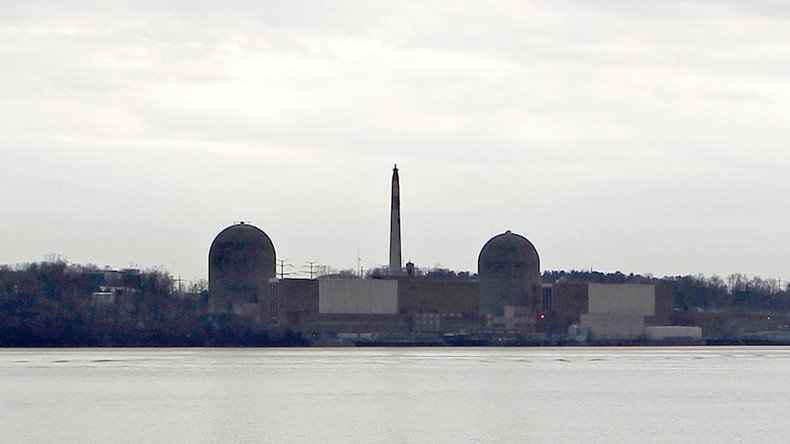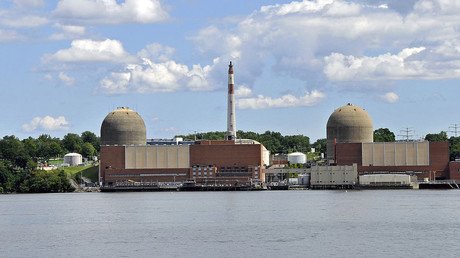New York can deny re-licensing to ‘antiquated’ Indian Point nuclear facility with history of leaks

New York can review renewal applications for federal licenses at Entergy Nuclear’s Indian Point nuclear plant outside New York City, a state court has ruled. The federal government has also returned the plant to normal oversight after repeated leaks.
There has been much opposition in the state ‒ from the Democratic governor on down ‒ to renewing Indian Point Energy Center's licenses because of repeated leaks and other mishaps. The aging nuclear plant is located along the Hudson River just 50 miles from densely populated New York City, and it generates approximately 2,000 megawatts of electricity for homes, business and public facilities in New York City and Westchester County.
Indian Point’s two remaining nuclear reactors in operation, Indian Point 2 and Indian Point 3, received their 40-year operating licenses from the Atomic Energy Commision ‒ now the Nuclear Regulatory Commission (NRC) ‒ in 1973 and 1975, respectively. Those licenses expired in 2013 and 2015, and the two reactors have been operating on temporary ones ever since.
When Entergy, which bought the reactors in the early 2000s, applied to the NRC to relicense both reactors for a 20-year term in 2012, it said it was not subject to a state consistency review under New York’s Coastal Management Program, adopted in 1982. That CMP outlines 44 enforceable statewide policies relating to coastal activities against which federal license renewals must be assessed. There were two narrow exemptions under the CMP, and Entergy argued that its nuclear plant met those exemptions.
The New York Department of State determined that Entergy’s relicensing application was not exempt from the consistency review, however. That decision led the company to ask the courts to annul the state’s requirement that the Indian Point reactors need a state review under the CMP.
On Monday, the New York Court of Appeals, the state’s highest court, overturned a lower court’s ruling and determined that the relicensing process for the Indian Point reactors must comply with state rules about what can operate in coastal waters.
Indian Point does not meet the CMP exemptions because those projects “had final environmental impact statements completed prior to the adoption of the CMP do not apply to re-licensing,” Judge Sheila Abdus-Salaam wrote in the unanimous 16-page decision.
“Entergy's current application for a license to operate the Indian Point nuclear reactors for an additional 20 years is a new federal action, involving a new project, with different impacts and concerns than were present when the initial environmental impact statements were issued over 40 years ago,” she added. "In sum, the Department of State's... conclusion that Entergy's application to re-license the nuclear reactors at Indian Point is subject to consistency review are rational, and must be sustained."
Entergy is "reviewing the court's decision to determine its next steps," spokesman Jerry Nappi said in a statement.
Governor Andrew Cuomo praised the court’s decision, noting that the Department of State has “already concluded that the Indian Point relicensing application is inconsistent with New York’s long-standing Coastal Management Program requirements and will continue to use this program to protect New York’s coastline.”
“Indian Point is antiquated and does not belong on the Hudson River in close proximity to New York City, where it poses a threat not only to the coastal resources and uses of the river, but to millions of New Yorkers living and working in the surrounding community," Cuomo’s statement concluded.
Despite the Cuomo administration’s stated opposition to extending new licenses, Entergy remains hopeful that the state will allow Indian Point to be re-licensed.
"Notwithstanding today’s court decision, we continue to believe we will ultimately be successful in obtaining a [Coastal Zone Management] permit and re-licensing Indian Point," Nappi said.
On Tuesday, Entergy received some good news about Indian Point, however. The NRC returned Indian Point 3 to its normal level of oversight, after a year of supplemental inspections, the Peekskill Patch reported. The plant’s performance review was downgraded in one area after three days of unplanned reactor shutdowns last December. The cause was eventually determined to be a “bird streamer,” company officials said in March.
“Streamers are long streams of excrement from large birds that are often expelled as a bird takes off from a perch.”
In February, Cuomo ordered a probe into Indian Point after an “unacceptable” groundwater leak of “radioactive tritium-contaminated water” that contained “alarming levels of radioactivity” was discovered at three monitoring wells. One of the three wells in question, according to Cuomo’s statement, had “radioactivity increasing nearly 65,000 percent.”
The NRC determined that Indian Point 3 could be returned to normal oversight after Entergy successfully determined the root cause behind the shutdowns; planned or implemented corrective actions; and evaluated whether the issues could impact other parts of the plant’s performance, NRC spokesman Neil Sheehan said.













